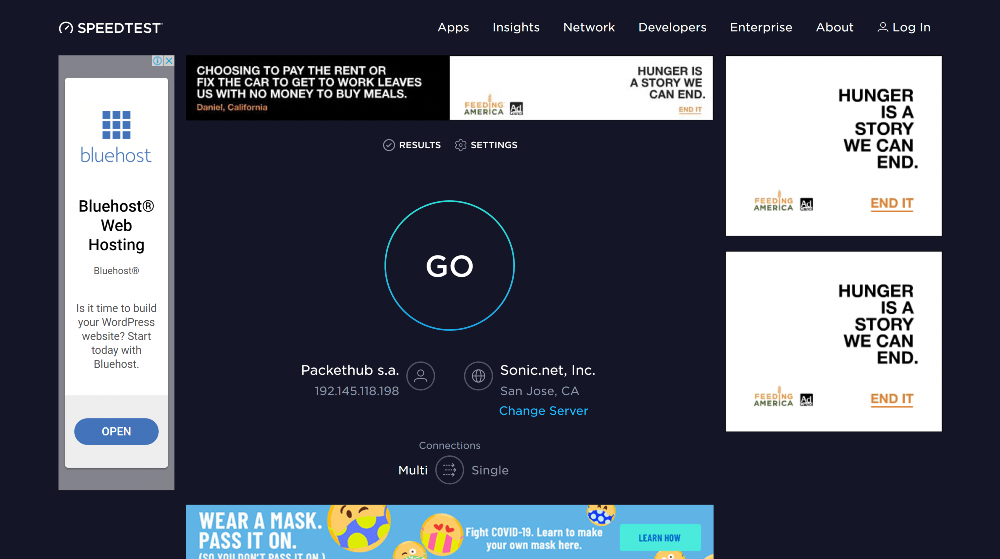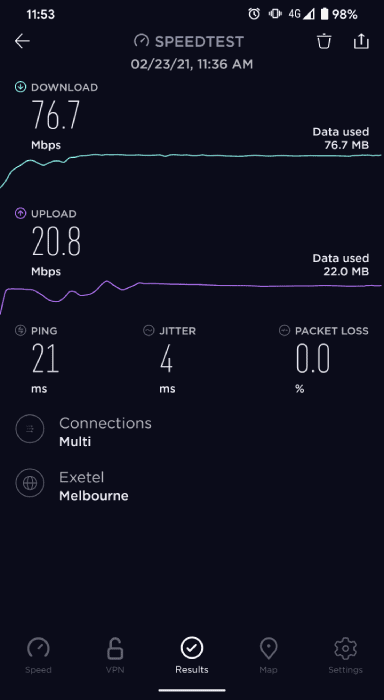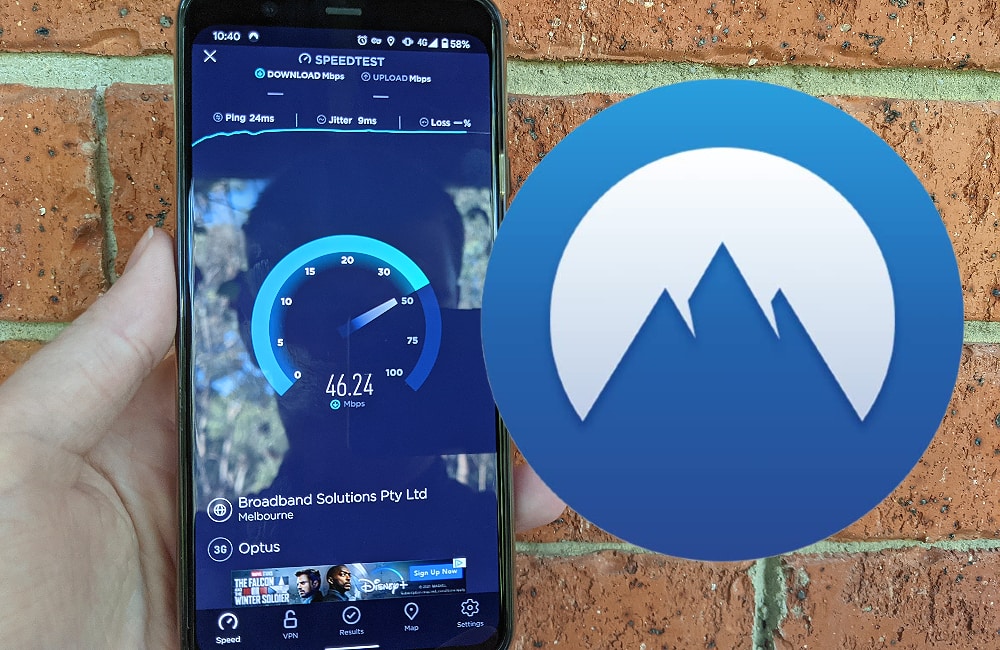How Fast Is NordVPN? – My Extensive Speed Tests Using NordVPN
A VPN like NordVPN is very useful for securing and encrypting all your traffic on the internet which is very good. But seeing as when you use a VPN, all your data goes through the VPN server, it is inevitable that it will make your internet connection slightly slower.
So naturally, if you’re thinking of signing up to NordVPN, you’re no doubt wondering just how fast NordVPN is. So in this article, I’m going to attempt to answer that question.
Obviously, the speed you get when using NordVPN will vary greatly depending on other factors like the speed of your internet connection, what server you’re connected to, what website you’re visiting, and the time of day so I can’t really tell you exactly how fast NordVPN will be for you.
But, I’ve done a whole lot of different speed tests connected to different servers and different internet connections at different times of the day. So hopefully, all this information will give you a fairly good idea as to how fast NordVPN will be for you.
How Fast Is Nord VPN
Table of Contents
If you’re not interested in looking at a whole lot of test results, the quick answer is:
In my testing, I averaged 52 Mbps down, 12 Mbps up, and a ping of 20 MS when connected to NordVPN using auto connect on an internet connection that averages 68 Mbps down, 9 Mbps up, and a ping of 15 MS.
So that means on average, the download speed was 23% slower with NordVPN connected than with no VPN at all. Which if you ask me, is very good for a VPN and the slight decrease in speed is well worth it considering the benefits of using a VPN.
I should again say that your speeds may vary depending on heaps of different factors, but hopefully, this helps to give you a rough idea of the sort of speeds you might get with NordVPN.
But if you want some more information about the speed of NordVPN, let’s take a full look at all the testing I’ve done.
How I’ve Tested NordVPN

To try and collect as much data as possible, I’ve done these tests with speedtest.net over various different times and with two different internet connections.
I did tests on my laptop connected to my home Wifi, and at the same time, I also did tests on my smartphone connected to 4G in order to get an idea of how the VPN speed varies based on the speed of the internet connection.
And I also varied the servers. Every time I did a speed test, I would do one test with no VPN connected (as a baseline), one test while connected to the best available server using auto connect, and one test connected to a server in a county on the other side of the world to get an idea of how it performed over a long distance. And I did this over both Wifi and 4G.
To see how the speed changes at different times of the day, I made sure I did the tests at different times every day rather than at the same time every day.
So with all this, I ended up doing a total of 36 different speed tests. Let’s take a look at the results…
The Test Results
 If we average out all the different tests I did over my Wifi, my average Wifi speed with no VPN connection was 33.56 Mbps down and 1.25 Mbps up with an average ping of 28.33 MS.
If we average out all the different tests I did over my Wifi, my average Wifi speed with no VPN connection was 33.56 Mbps down and 1.25 Mbps up with an average ping of 28.33 MS.
And then, with NordVPN connected to the nearest available server, the average speed became 22.78 Mbps down and .94 Mbps up with an average ping of 39.5 MS.
So when connected to the nearest server, the average download speed became 32% slower than what it was with no VPN at all, the average upload speed became 24% slower. And the average ping was 31% higher which is to be expected as using a VPN adds a bit of latency.
So that’s what it was like using the nearest server possible, but the tests when connected to a server on the other side of the world were quite a bit slower which is to be expected considering how far the data has to travel.
The average download speed was 18.59 Mbps, which is still easily fast enough to do things like stream international Netflix in HD, with an average upload speed of 0.73 Mbps which is not great, but it gets the job done, and an average ping of 209 MS.
Now, if we take a look at the tests I did over 4G, we’ll see some different results. As you can probably tell by the average speed I mentioned above, my home Wifi is really not very good, which of course means when I use NordVPN over my Wifi, the speed is slower than what NordVPN would usually be capable of.
But, I actually do get pretty fast speeds over 4G on my phone, so if you want to see how fast NordVPN is on a faster connection, let’s take a look at the tests I did over 4G.
With no VPN connected, my average 4G download speed was 68.97 Mbps, with an average upload speed of 9.38 and an average ping of 15 MS.
But when connected to the nearest available NordVPN server using auto connect, the average download speed became 52.92 Mbps, with an average upload speed of 12.93 Mbps, and an average ping of 20 MS. So as I’m sure you can see from these results, NordVPN gets much faster when used over a faster internet connection.
So when connected to the closest NordVPN server over 4G, the average download speed became 23% slower than without the VPN, and the average upload speed actually became 37% faster, but that’s just because the upload speeds in one of my non VPN tests was strangely low. And the average ping was 31% higher.
When connected to a NordVPN server on the other side of the world with 4G, the average download speed was 59 Mbps which is pretty remarkable considering how far the data has to travel, and the average upload speed was a decent 10.79 Mbps, and the average ping was 204 MS.
So that’s the average speeds which should give you a fairly good idea of what NordVPN is like, but it’s also worth taking a look at the evening speeds.
NordVPN Evening Speeds
If we just look at the tests I ran during the evenings, my regular Wifi speed averaged 31.9 Mbps down while the speed when connected to NordVPN over Wifi only averaged 16.86 Mbps which is a 47% drop. And my regular 4G speeds in the evenings averaged 70 Mpbs down while the speed when connected to NordVPN over 4G only averaged 42 Mbps which is a 38% drop.
So I think it’s pretty safe to say that NordVPN will be slower in the evenings, but it’s still perfectly useable at these speeds so I wouldn’t be overly concerned.
NordVPN Daytime Speeds
If you only plan on using NordVPN during the day, you might be pleased to know that without the evening speeds slowing down the average, the speeds you could expect might be a little higher.
If we look at only the tests I did during the day, my regular Wifi speed averaged 34.4 Mbps down, while the download speed when connected to NordVPN over Wifi averaged 25.27 Mbps which is only a 25% drop.
And my regular 4G speeds during the day averaged 68.35 Mbps down, while the average download speed when connected to NordVPN over 4G was an incredible 57.95 Mbps which means it was only a drop of 15%.
Conclusion
So while it’s pretty much impossible for me to tell you exactly how fast NordVPN is, hopefully, all this data has helped you to get a reasonable idea of what sort of speeds you could expect over NordVPN.
And at the end of the day, when it’s usually only around 15% – 30% slower than your regular internet connection, you probably won’t even notice the difference without running a speed test.
If you’d like to sign up to NordVPN to secure your browsing with barely any loss of speed, click here to learn more and get started today.







